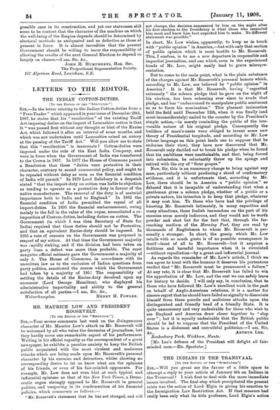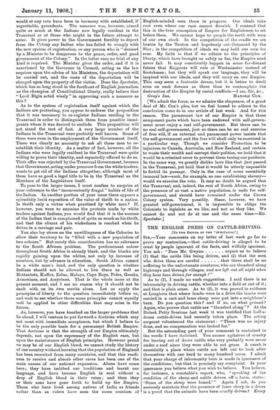THE INDIANS IN THE TRANSVAAL. [TO THE Eorrott OF THE
" Se carATott."]
SIR,—Will you grant me the favour of a little, space to attempt a reply to your article of January 4th on Indians in the Transvaal ? I wish first to deal with the more immediate issues involved. The final step which precipitated the present crisis was the action of Lord Elgin in giving his sanction to the Immigration Law Restriction Act. . If that measure had really been only what its title professes, Lord Elgin's actical would at any rate have been in harmony with established, if regrettable, precedents. The mea.Sure was, however, aimed quite as much at the Indians now legally resident in the Transvaal as at those who might in the future attempt to enter. It gives power tp the Government forcibly to deport from the Colony any Indian who has failed to comply with the new system of registration, or any person who is "deemed by a Minister to be dangerous to the peace, order, and good government of the Colony." In the latter case no trial of any kind is required. The Minister gives the order, and if it is sanctioned by the Governor in Council, acting as the law requires upon the advice of his Ministers, the deportation will be carried out, and the costs of the deportation will be charged upon the property of the victim. Does the Spectator, which has so long stood in the forefront of English journalism as the champion of Constitutional liberty, really believe that "Lord Elgin acted wisely" in approving such a measure as this ?
As to the system of registration itself against which the Indians are protesting, you appear to endorse the proposition that it was necessary to re-register Indians residing in the Transvaal in order to distinguish them from possible immi- grants whom it was desired to exclude. This proposition will not stand the test of fact. A very large number of the Indians in the Transvaal were perfectly well known. Some of them were even in the employment of the Government itself. There was clearly no necessity to ask all these men to re- establish their identity. As a matter of fact, however, all the Indians who were legally resident in the Transvaal were quite willing to prove their identity, and repeatedly offered to do so. Their offer was rejected by the Transvaal Government, because that Government, acting under pressure from the white traders, wants to get rid of the Indians altogether, although most of them have as good a legal title to be in the Transvaal as the Members of the Legislature itself.
To pass to the larger issues, I must confess to surprise at your reference to the "inconveniently frugal" habits of life of the Indian. In another portion of your issue there appears a splendidly lucid exposition of the value of thrift to a nation. Is thrift only a virtue when practised by white men? If, however, you were to examine the protests made by white traders against Indians, you would find that it is the success of the Indian that is complained of quite as much as his thrift, and, that the climax of his wickedness is reached when he drives in a carriage and pair.
You also lay stress on the unwillingness of the Colonies to allow their territory to be "filled with a new population of two colours." But surely this consideration has no relevance to the South African problem. The predominant colour throughout South Africa is already black, and the blacks are rapidly gaining upon the whites, not only by increase of numbers, but by advance in education. South Africa cannot be a white man's land, and the only question is whether Indians should not be allowed to live there as well as Hottentots, Kaffirs, Zulus, Malays, Cape Boys, Poles, Greeks, Armenians, and Assyrians. That is the whole issue at the present moment, and I see no reason why it should not be dealt with on its own merits alone. Let us apply the principles of liberty to the question immediately before us,- and wait to see whether those same principles cannot equally well be applied to other difficulties that may arise in the future.
As, however, you have touched on the larger problems that lie ahead, I will venture to put forward a doctrine which may not meet with immediate acceptance, but which I believe to be the only possible basis for a permanqnt British Empire: That doctrine is that the strength of our Empire ultimately depends, not upon the supremacy of the English race, but upon the maintenance of English principles. However proud we may be of our English blood, we cannot study the history of our country without learning that the population of England has been recruited from many countries, and that this readi- ness to receive and absorb other races has been one of the main causes of our national expansion. Aliens have come here; they have imbibed our traditions and learnt our language, and have become English in soul without a drop of English blood in their veins ; and then they or their sons have gone forth to build up the Empire. Those who have lived among natives of India as friends rather than as rulers have seen the same creation of
English-minded men there in progress. Our ideals take root even where our race cannot flourish. I contend that this is the true conception of Empire for Englishmen to set before them. We cannot hope to people the earth with men of our own stock. In the competition of the cradle we are beaten by the Teuton and hopelessly out-distanced by the Slav ; in the competition of ideals we may hold our own for ever. My faith is that if we adhere to the principles of liberty, which have brought us safely so far, the Empire need never fail. It may conceivably happen in some far-distant future that Rajpoots will rule at Westminster instead of Scotchmen ; but they will speak our language, they will be inspired with our ideals, and they will carry on our Empire. This may seem a fantastic dream, but it is better to dwell even on such dreams as these than to contemplate the destruction of the Empire by racial conilicts.—I am, Sir, lee., We admit the force, as we admire the eloquence, of a great deal of Mr. Cox's plea, but we feel bound to adhere to the conclusion come to in our article of last week. And for this reason. The paramount law of our Empire is that those component parts which have been endowed with self-govern- ment must enjoy a real self-government. But there can be no real self-government, just as there can be no real exercise of free will, if an external and paramount power insists that the self-government and the free will shall only be exercised in a particular way. Though we consider Protection to be injurious to Canada, Australia, and New Zealand, and certain to waste their wealth and corrupt their politics, we hold that it would be a criminal error to prevent them taxing our products. In the same way, we greatly dislike laws like that just passed in the Transvaal, yet hold that it would be utterly impossible to forbid its passage. Only in the case of some essentially immoral law—such, for example, as one establishing slavery— would we exercise the veto. It may no doubt be argued that the Transvaal, and, indeed, the rest of South Africa, owing to the presence of so vast a native population, is unfit for self- government, and should have remained under the Crown Colony system. Very possibly. Since, however, we have granted self-government, it is impossible to oblige the Colonists to legislate as we like, and not as they like. We cannot do and not do at one and the same time.—ED. Spectator.]











































 Previous page
Previous page